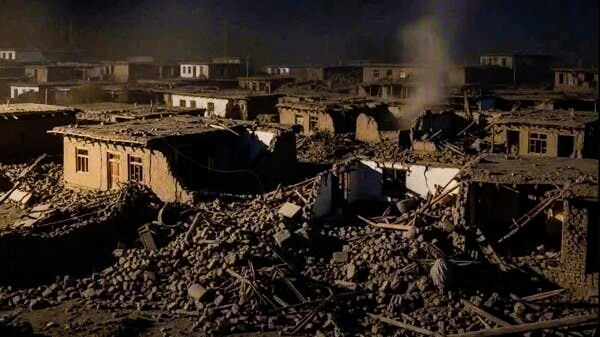Hundreds of people have died and many have been injured due to a strong 6 magnitude earthquake that struck an area in eastern Afghanistan near the border with Pakistan last night, according to local officials and the U.S. Geological Survey.
The earthquake occurred late at night, making rescue operations in remote areas more difficult.
Governor of Konar province, which was the most affected, Mawlawi Qadirullah, announced that the death toll has exceeded 500, while the number of injured has surpassed several hundred.
He added that many remote areas and valleys remain isolated due to road blockages caused by landslides, making it difficult for rescue teams to reach them.
Despite these difficulties, relief helicopters have reached some areas to assist the injured and transport them to hospitals.
According to initial reports, the Deputy Head of Afghan National Radio and Television in the Taliban, Hidayatullah Hedayat, stated that the death toll could exceed 600, while the number of injured has reached over a thousand.
The "Tolo News" agency reported local officials confirming that the earthquake struck the center of Konar province, and the aftershocks that followed were also felt in Nangarhar, Laghman, and Panjshir provinces.
According to the U.S. Geological Survey, the earthquake occurred at 19:17 GMT, with its epicenter at a depth of 10 kilometers, about 42 kilometers northeast of Jalalabad.
This earthquake is one of the recurring natural disasters that Afghanistan faces, as the Indian and Eurasian tectonic plates intersect in the Hindu Kush mountain range, which experiences intense seismic activity.
As part of humanitarian efforts, the Afghan Ministry of Health reported that medical teams are still trying to reach the affected areas, facing significant challenges due to weak infrastructure and rugged mountainous regions.
Despite the efforts of search and rescue teams, the operations to recover victims and survivors are ongoing, amid growing fears that the death toll will rise as time progresses and teams reach the most affected areas.
Afghanistan experienced a series of earthquakes in the west of the country last year, resulting in the deaths of over a thousand people, highlighting the vulnerability of this impoverished country in the face of natural disasters.
The international community is closely monitoring the situation and working to provide humanitarian assistance, while rescue operations continue as local residents struggle to cope with the aftermath of this devastating earthquake.

